AESA PROGRAMMES
- Building R&D Infrastructure
- Developing Excellence in Leadership, Training and Science in Africa (DELTAS Africa)
- Human Heredity and Health in Africa (H3Africa)
- Africa’s Scientific Priorities (ASP)
- Innovation & Entrepreneurship
- Grand Challenges Africa
- Grand Challenges Innovation Network
- Rising Research Leaders/Post-Docs
- AESA RISE Postdoctoral Fellowship Programme
- African Postdoctoral Training Initiative (APTI)
- Climate Impact Research Capacity and Leadership Enhancement (CIRCLE)
- Climate Research for Development (CR4D)
- Future Leaders – African Independent Research (FLAIR)
- Critical Gaps In Science
- Clinical Trials Community (CTC)
- Community & Public Engagement
- Mobility Schemes: Africa-India Mobility Fund
- Mobility Schemes: Science and Language Mobility Scheme Africa
- Research Management Programme in Africa (ReMPro Africa)
- Science Communication/Africa Science Desk (ASD)
- Financial Governance: Global Grant Community (GGC)
- AAS Open Research
- CARI Programmes
- Evidence Leaders Africa (ELA)
All Affiliates
AAS Fellows and Affiliates are distinguished researchers who represent the Continent’s talent and promising men and women from across the globe
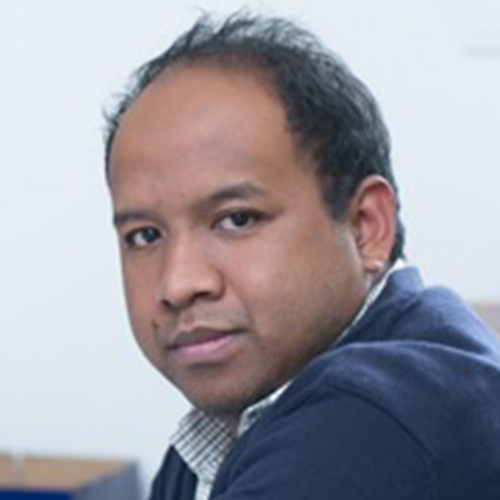
Medical & Health Sciences
Madagascar
Cohort 5
Niaina Rakotosamimanana has a sandwich PhD in microbiology obtained at the Sorbonne University, Paris France and the University of Antananarivo, Madagascar. After several positions as postdoctoral fellow and researcher in France and Madagascar, He was recruited at the Pasteur Institute of Madagascar where he has been leading the Mycobacteria Unit since May 2016. He is in charge of the tuberculosis research program which includes translational and operational researches that aimed to develop new TB diagnostic tools and to perform drug resistance surveillance in collaboration with the National Tuberculosis Control Program of Madagascar.
He has track record in cohort studies, bacterial immunology and molecular epidemiology. His main achievements are the description of human blood markers of progression from latent to active tuberculosis as well as the influence of the TB clinical strains diversities on the human host responses and clinical issues. His lab has international collaborations with the most prestigious research institutions in Africa, the USA, the UK and Europe. He is involved in different research grants to lead innovative tuberculosis research projects for the use of new technologies for TB healthcare delivery in remote settings, the use the portative NGS sequencers to search for drug resistance in situ and different immunological tools to evaluate new TB vaccines and treatments through different clinical trials.
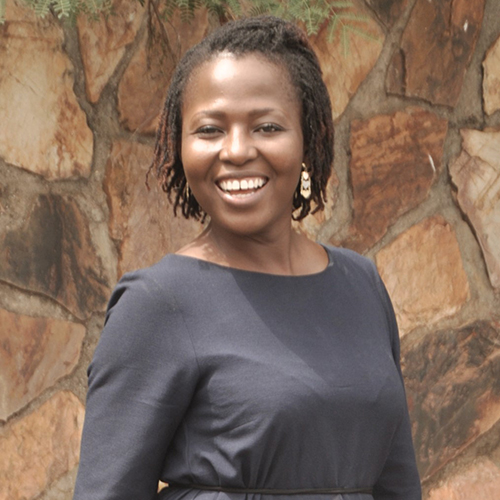
Geological, Environmental, Earth & Space Sciences
Ghana
Cohort 5
Dr Edem Mahu is a lecturer of Marine Geochemistry at the Department of Marine and Fisheries Sciences of the University of Ghana. She earned her PhD in Oceanography at the University Ghana in 2014. Her research pioneered the use of radioisotopes in reconstructing the pollution history of heavy metals in nearshore systems in the Gulf of Guinea over the last 150 to 200 years. She is currently the lead researcher of an OWSD funded project that is developing cheap and easily accessible android coupled soil nutrient test kits to guide fertilization application in farmlands around coastal water bodies in Ghana.
She is also leading research in toxicology funded by the IFS that seeking to evaluate ecological and human health risks associated with heavy metal pollution in coastal Ghana. She is a key research personnel on the GCRF funded project on Global Food Safety and ecosystem functioning implications of nano and micro-scale plastics in coastal Ghana. Dr. Mahu is also the country coordinator of the NF-POGO Alumni Network global project on the observation of essential ocean parameters across the world. She has been co-directing the Regional Coastal Ocean Environment Summer School in Ghana since 2016. She is a recipient of a number of prestigious awards and research fellowships including: an OWSD Early Career Fellowship; two (2) IFS) research grants; an H. Thomas Harvey Research Fellowship award and a California State University Council on Ocean Affairs, Science and Technology (CSU-COAST) award.
She is passionate about mentoring young girls into STEM programmes.
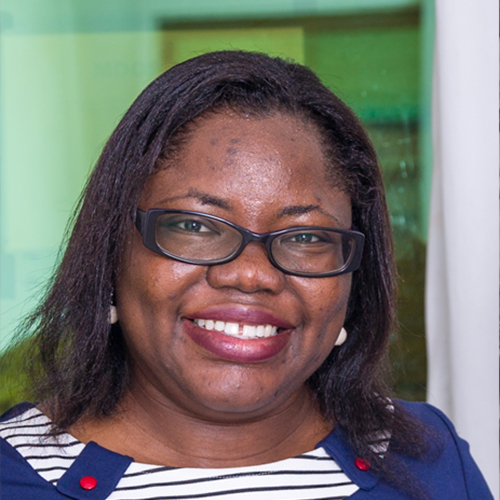
Biosciences
Ghana
Cohort 5
Dr Lydia Mosi is a Senior Lecturer at the Department of Biochemistry, Cell and Molecular Biology, University of Ghana and the Logistics Coordinator of the West African Centre for Cell Biology of Infectious Pathogens (WACCBIP). She holds a double major BSc. degree in Biochemistry and Zoology and a PhD in Microbiology with a focus on Microbial pathogenesis from the University of Tennessee, Knoxville in 2009.
She was an AFRIQUE One postdoctoral fellow at the Swiss Centre for Scientific Research (CSRS) in Côte d’Ivoire [2011-2014] and a research fellow of the Cambridge-Africa Partnership for Research Excellence (CAPREx) [2016-2017]. Her research interest is with Buruli ulcer, a necrotizing skin ulcerative disease caused by Mycobacterium ulcerans. Using in silico genomics and functional laboratory studies, she is investigating the existing gaps in transmission by exploiting multidisciplinary approaches to identify the environmental niche of mycobacteria of medical importance.
Her interests also include the development of rapid diagnostic and intervention strategies for the disease. She also works on the determination of antimicrobial resistance in microbes from patient and environmental samples. She has supervised and trained over 15 graduate students and her research is funded by the Fleming Fund, World Bank, Wellcome trust, Global Challenges Research Fund, International Foundation for Science and the University of Ghana Research Fund. Dr. Mosi has 24 publications in peer-reviewed journals and contributed to 2 book chapters. She has presented papers at several national and international conferences and is passionate about training the next generation of young African Scientists.
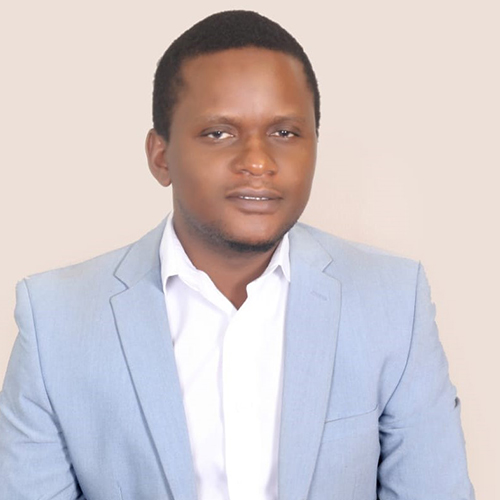
Geological, Environmental, Earth & Space Sciences
Zimbabwe
Cohort 5
Shakespear Mudombi holds a PhD in Environmental Management from the University of South Africa, a Collaborative MSc in Agricultural & Applied Economics from the University of Zimbabwe (electives at University of Pretoria) and a BSc honours in Agricultural Economics from the University of Zimbabwe.
He is a researcher with interest in multi-disciplinary issues including green economy; climate change; sustainable development; agriculture; environment; water and sanitation; value chains and industrial policy; SMMEs, ICTs; and science, technology and innovation. He has experience in research, monitoring, evaluation, project management, data analysis including GIS applications, programming, big data, and systems analysis.
Shakespear Mudombi currently works as a Sustainable Growth Economist at the Trade and Industrial Policy Strategies (TIPS) based in Pretoria, South Africa. Previously, he worked as a Post-doctoral researcher at the Council for Scientific and Industrial Research (CSIR), working on an ESPA funded research project assessing biofuel impacts on ecosystem services, human wellbeing and poverty alleviation in Sub-Saharan Africa. He also worked as an NRF SARCHi PhD research fellow based at the Institute for Economic Research on Innovation (IERI) at Tshwane University of Technology.
In 2014, Shakespear attended the Bergen Summer Research School held at the University of Bergen in Norway. In 2012-2013, he was part of the Southern Africa Young Scientists Summer Program (SA-YSSP) hosted by the University of Free State in conjunction with IIASA, DST, and NRF. In 2012, he participated in the GLOBELICS PhD Academy on Innovation and Economic Development held at the Federal University of Rio de Janeiro, Brazil.
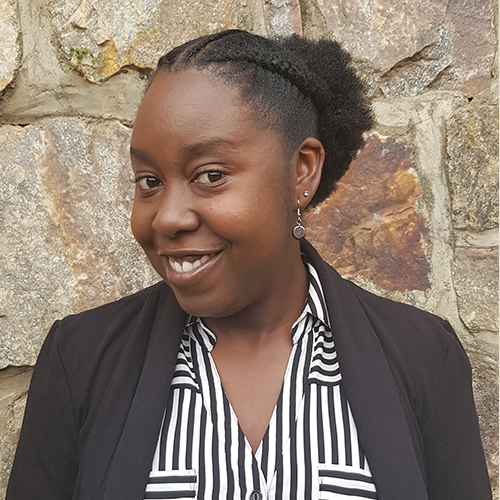
Agricultural & Nutritional Sciences
Zambia
Cohort 5
Dr Felicitas Esnart Mukumbo is the Poultry and Swine Enterprise Lead at the Rwanda Institute for Conservation Agriculture (RICA); a role with the three-fold mission of teaching using the experiential education approach, extension work and applied research. Prior to this, she was a postdoctoral research fellow at the University of Fort Hare (UFH) in South Africa, funded by the DST-NRF Centre of Excellence in Food Security. She completed her PhD and MSc at UFH, on scholarships from South Africa’s National Research Foundation and the UK-based Canon Collins Trust; her BSc at the University of Namibia and secondary school in her home country Zambia.
Her research interests traverse both ends of the livestock production chain from the farm-to-fork including sustainable animal production practises, the development of functional meat products using bioactive compounds of natural origin, and the implications of both on the future of agriculture and food security. Felicitas is a recipient of the South African Society for Animal Science Bronze Medal in the Research Category, the African Women for Agricultural Research and Development (AWARD) Fellowship and she has co-guest edited a special issue of the journal Food Research International. She has presented and published her work in internationally renowned conferences and journals respectively, and through industry commissioned reviews and magazine articles.
Felicitas is passionate about the roles that sustainable agriculture, science and communication can play in mitigating global challenges, protecting the environment and improving the lives of many. She strives to contribute to these goals through her work and research.
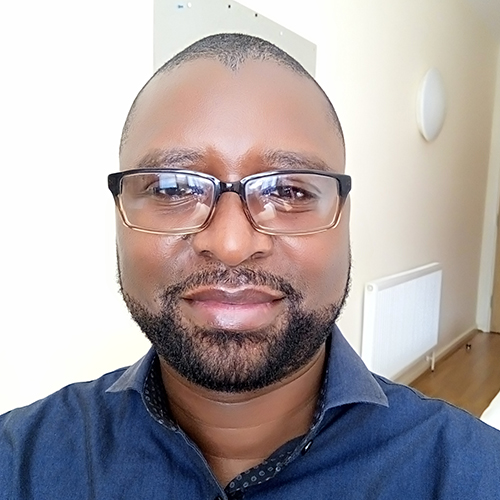
Biosciences
Zimbabwe
Cohort 5
Victor K. Muposhi is an Associate Professor and Deputy Dean in the School of Wildlife, Ecology and Conservation at Chinhoyi University of Technology (CUT), Zimbabwe. He is also a Coordinator for the MSc in Biodiversity Conservation Degree Programme in the same School. He is a holder of a Doctor of Philosophy in Conservation Biology (CUT, 2016), an MSc in Conservation Biology (2009), and a Bachelor of Environmental Sciences (Hon) in Wildlife and Rangeland Management (2005), both obtained at Bindura University of Science Education.
He was the Chairperson for the Wildlife and Safari Management, now Wildlife Ecology and Conservation Department at CUT for the period 2011-2013. During this period, he coordinated the transformation of the department into the first School of Wildlife, Ecology and Conservation in Zimbabwe. In 2017, he was awarded an AfOx Travel grant to Oxford University towards fostering a new research collaboration on monitoring elephant poaching in Zimbabwe, and sharing experiences on postgraduate training in conservation science. To date, Victor has published several scientific articles as peer-reviewed journal articles and conference proceedings. Victor has broad interdisciplinary research interest in biodiversity conservation, spatial ecology, wildlife ecology, and sustainability science towards science-policy engagement. He endeavours to develop and support complementary pathways that engage and support communities to create an enabling environment thus reducing pressure on wildlife species and protected areas for sustainability.
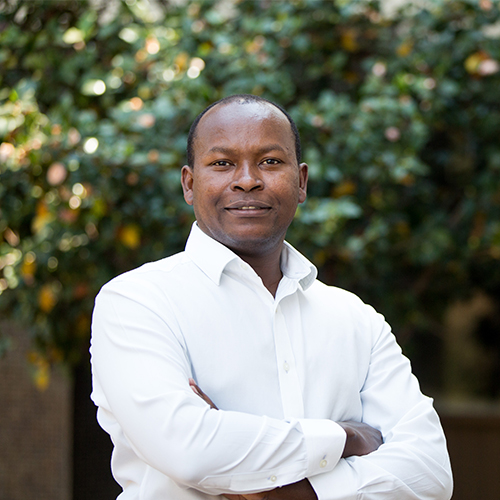
Chemical Sciences
Kenya
Cohort 5
Nicholas Musyoka is a Senior Research Scientist at the Council for Scientific and Industrial Research (CSIR) in South Africa. He holds a PhD degree in Chemistry from the University of the Western Cape (South Africa). For the past few years, his research interests have been focussed in the field of sustainable clean energy technologies with hydrogen storage being at the core.
Recently, he has expanded his research focus to other Energy-related aspects such as hydrogenation of carbon dioxide to produce methanol (and derivatives), biogas upgrading to produce biomethane and other waste beneficiation interests like Li-ion battery recycling. From his research activities, he has produced 4 patent applications (2 already granted), 52 peer-reviewed articles, 4 book chapters and over 70 international and/or local conferences presentations. Dr Musyoka is a member of the South African Chemical Institute (SACI), Royal Society of Chemistry (MRSC), registered Professional Natural Scientist (Pr.Sci.Nat.) and is also a NRF Rated scientist.
In addition to his research activities, he is also involved in the supervision and mentorship of early career researchers and postgraduate students (MSc and PhD students). Dr Musyoka has also been honoured with several awards/recognitions such as; Kambule-NSTF Awards ‘Science Oscars’ of South Africa’ (Emerging Researchers Finalist, 2018), CSIR-wide emerging researcher award - 2018, IJHE David Sanborn Scott award – 2017, CSIR-MSM emerging researcher award -2016, among others.
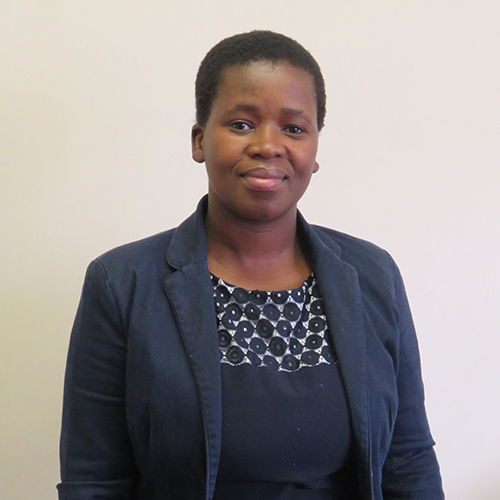
Chemical Sciences
South Africa
Cohort 5
Prof Philiswa Nosiso Nomngongo was born and raised in Flagstaff, Eastern Cape (South Africa). She graduated with BSc Applied Chemistry from the School of Chemistry, University of KwaZulu Natal in 2008 and received BSc (Hons) in Chemistry in 2009. She received her MSc and PhD degrees in 2011 and 2014 from UKZN and University of Johannesburg, respectively. In 2015, she joined the Faculty of Science at UJ, as a lecturer of Analytical Chemistry and since 2017 she have been an Associate Professor of Analytical Chemistry in the same institution. She was awarded a DSI/NRF South African Research Chair in Nanotechnology for water and hold a NRF Y1 rating. Her research interests focus on the development of sample preparation methods, use of multivariate/chemometric for data evaluation, environmental analytical chemistry, microextraction method, molecularly templated materials, nanomaterials for water treatment, membranes for water treatment, adsorption desalination, water quality and monitoring. Prof Nomngongo’s research efforts to date have led to the publication of more than 70 peer-reviewed articles. She participated in several international and national conferences. Her research achievements have been recognized through the award of prestigious fellowships and awards: L’Oreal-UNESCO Sub-Saharan Women in Science Regional fellowship in 2014; South African Women in Science award in the Distinguished Young Woman Research in the Natural and Engineering Sciences category in 2017 and Vice-Chancellor’s Distinguished Award: Most Promising Young Researcher of the Year in 2017. During her 5 years at the University of Johannesburg (2015-present), Prof Nomngongo has supervised/ co-supervised and graduated 17 MSc and 5 PhD students. She is currently, the supervisor/co-supervisor of a number of MSc and PhD students.
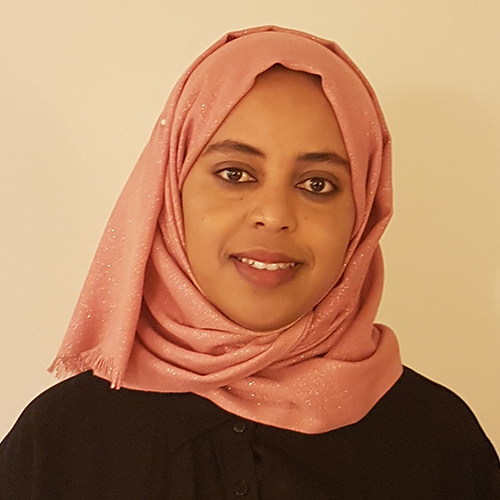
Engineering Technology & Applied Sciences
Ethiopia
Cohort 5
Zebib has been working in the field of nanocoatings for solar energy applications for nine years. Her research expertise includes synthesis, characterization and applications of selective solar absorbers. Zebib received her PhD degree in physics from University of the Western Cape, South Africa in 2014. She was a postdoctoral fellow at University of South Africa (UNISA) and iThemba LABS, National Research Foundation through the UNESCO -UNISA Africa Chair in Nanoscience and Nanotechnology for five years. She has published more than 50 high impact scientific papers in peer reviewed journals and more than 30 research papers presented in various international conferences. Currently Zebib is an associate Professor at Adigrat University (ADU) in Ethiopia. Prof Zebib is also a Future Leader African Independent Research (FLAIR) fellow funded by Royal Society-UK at UNISA and ADU. She was awarded from the OWSD, US -Africa Materials Initiative, TRIL programme for training and research in Italian Laboratories, Coimbra Group Scholarship for Sub-Saharan Africa, L'Oreal-UNESCO Regional Sub-Saharan Africa, and the TWAS-UNESCO research grant. Prof Zebib is also a Lindau Nobel laureate meeting alumnus, and member of the international Solar Energy Society among others. She has established international collaborators in various countries mainly in South Africa, UK, US, and Canada. Prof Zebib specialized in optics, nanomaterials, thin films, multilayers, and selective solar absorbers.

Medical & Health Sciences
Nigeria
Cohort 5
Dr Kolapo Oyebola completed his PhD in 2016. His research on malaria genetics won the overall best PhD thesis at the University of Lagos, Nigeria. He won a competitive postdoctoral fellowship funded by WACCBIP Wellcome Trust-DELTAS. Dr Oyebola was involved in the first fine-scale genomic mapping of malaria parasites in Africa. He is a faculty member of the University of Lagos, Nigeria. He is also currently a postdoctoral researcher at the National Heart, Lung and Blood Institute of the US National Institutes of Health, where he currently investigates sickle cell genetics among Americans of African descent. In addition, he applies genetic tools to detect mutations associated with blood cancer and cardiovascular diseases. Dr Oyebola also spends some time as an Adjunct Research Fellow at the Nigerian Institute of Medical Research. He is a member of the African Society of Human genetics, American Society of Human Genetics and International Society of Infectious Diseases.
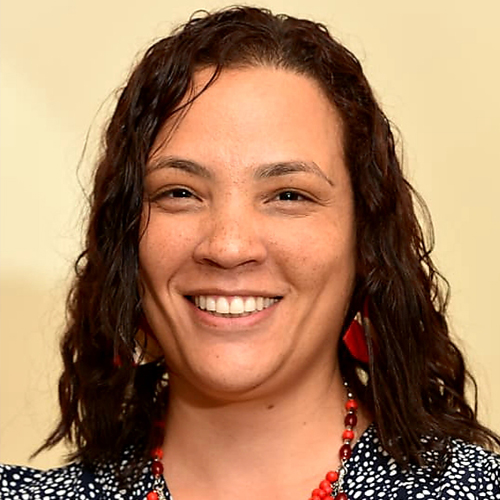
Medical & Health Sciences
South Africa
Cohort 5
Dr Lenine Liebenberg, PhD is a Scientist at the Centre for the AIDS Programme of Research in South Africa (CAPRISA) Mucosal Immunology Laboratory, an honorary Senior Lecturer at the University of KwaZulu-Natal, and a Future Leaders – African Independent Researcher (FLAIR) Fellow. Dr Liebenberg’s combined training in medical virology, microbiology, genetics, and immunology direct the scope of her research in understanding immune responses at the human genital mucosa. She has documented methods to improve genital cell isolation from men and women, methods to facilitate genital cellular immune responses in multicentre studies, and has characterised genital and systemic immune factors that facilitate HIV infection, viral shedding and HIV transmission.
Her research has highlighted the role of poor female genital health in enhancing HIV acquisition and focuses on understanding the causes of genital inflammation and the mechanism of its association with HIV acquisition to inform on the design of effective interventions that prevent HIV infection in women.
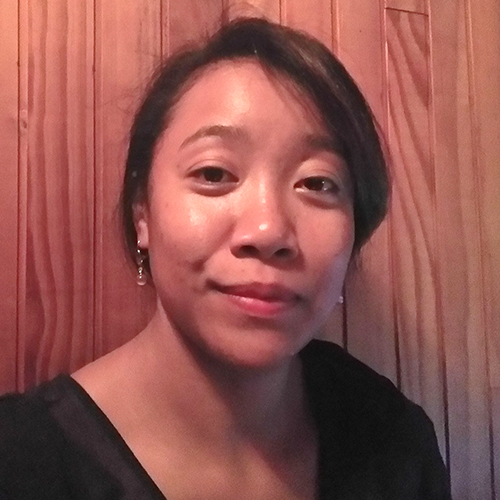
Agricultural & Nutritional Sciences
Madagascar
Cohort 5
Dr Miora Ramanakoto is a post-doctoral researcher at the Forestry and Environment Department, School of Agronomy (ESSA), Antananarivo University, Madagascar. Her main
research field is Wood Sciences and Technology. She is actually working on the determination and implementation of best practice techniques for future wood identification analysis. She is also
helping in the coordination of a protected area in south-west Madagascar, and contributes to the development of the research activities in the protected site, in collaboration with
local communities, as she is also very interested in biodiversity conservation and natural resource management. Her PhD research focused on the characterization of wood machined surfaces for
optimal finishing and bonding performances. She also investigated the preferences of consumers in wood attributes such as surface, physical and aesthetical characteristics in order to optimize
production processes and for a better valorization of forest resources.
She has published several research works in international journals and has reviewed papers for the Annals of Forest Science journal. She is currently leading a professional licence degree in Wood Production and Construction at ESSA. She teaches courses about Wood Use in the Agri-food Sector, management of production, and production processes. Dr Miora Ramanakoto would like to share knowledge and experiences to the future generation of young researchers. She wants to influence young Malagasy people that scientific research is one of the key tools for the development of a country, and especially to contribute to the Academy’s vision of transformed lives through science in Africa.
Pagination

Elected: